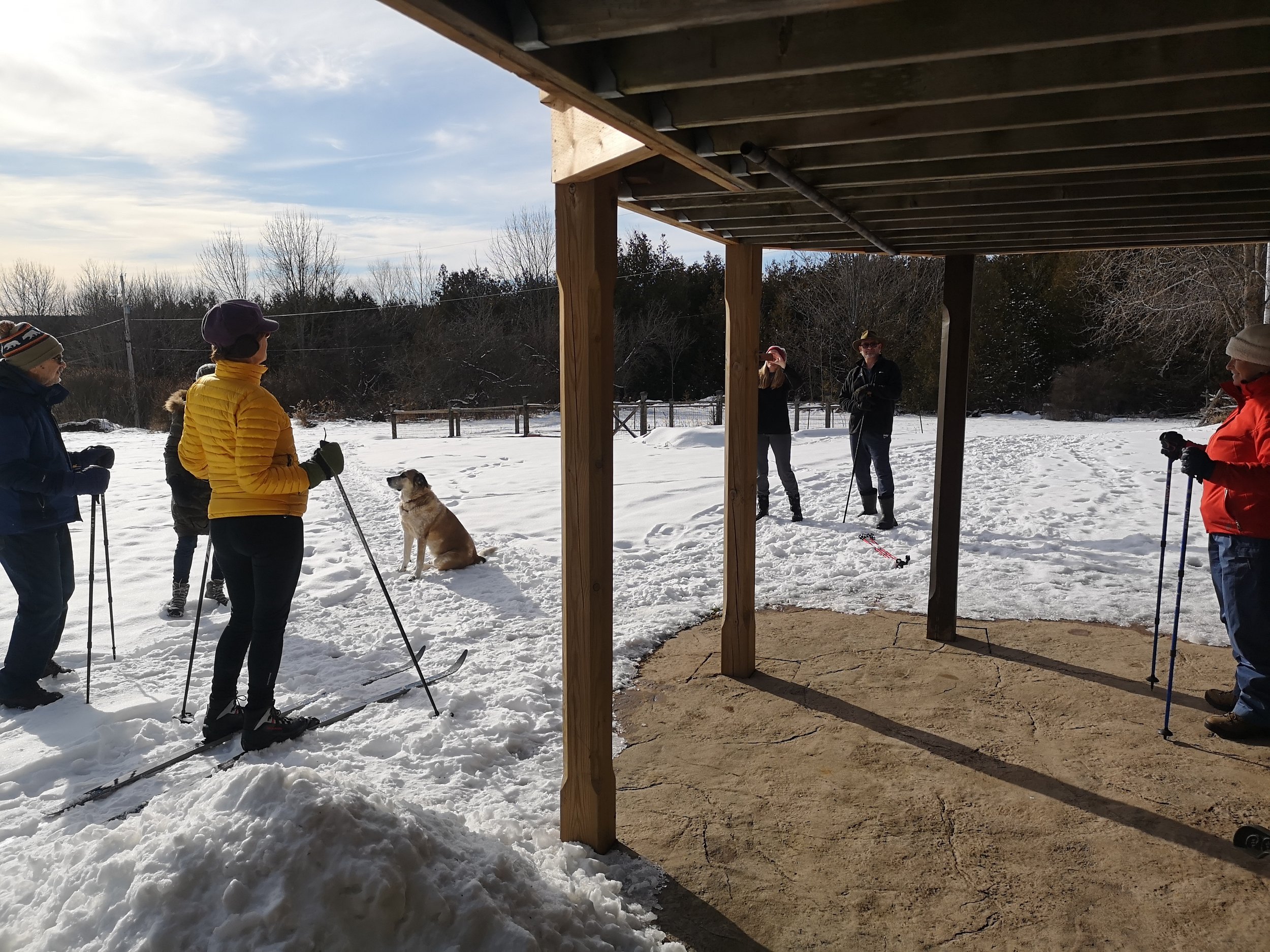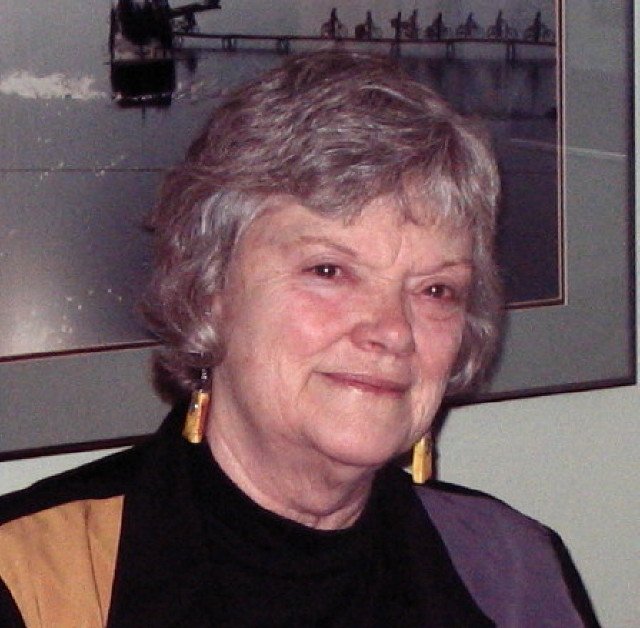Pop-up meditation
When Rick Metcalf said the words "Pop Up Meditation" during a Wednesday morning KCC chat, he had my attention. That was before Christmas. Since then, a small group of early birds don’t exactly pop-up, but do manage to “chirp” greetings (some not so chirpy) at 8:30 am on a Sunday morning. We ease into the day.
Stew Holland (with help from Marg) opened up one of the first sessions. Stew was brave and gracious in giving us an excellent description of the Art of Living. He described his practice metaphorically as using a washing machine over and over. Stew has been practicing this method for more than 20 years. He described how it helps him to be calmer and cope with daily life. Stew's description was from the heart and led us right into a lovely 30-minute silent meditation.
Rick Metcalf likes to do research. He described 9 different ways to meditate. It was helpful to hear how he uses them all to quiet his busy mind. Rick often sends out loving energy to people he cares about. We could feel that in the group.
Gayl Hutchison is an experienced meditator who told us about how she began meditation as a child when she visited her grandmother in rural Nova Scotia. Her story resonated with the group. We were grateful to find some peace amidst the inner storms and disappointments of the holiday season.
Pati Beaudoin has gifted us twice with loving kindness guided meditation. The words that she used and her voice made it easy for most of us to slip into a very good place where we could feel love for ourselves and then gradually for others. Even for the “others” who we may not be in sync with. May we continue to bring on more loving kindness.
According to a KCC survey, 40% of you are interested in meditation. It is a delightful surprise that, even though we are not in the same room, we can really connect doing meditation online. Whether you are a rookie or an experienced student of meditation, please join us. It is so much easier to practice meditation when you have the support of caring people. I am grateful to the equity members who encouraged me to start the group. I feel very welcomed. We meet Sunday mornings at 8:30am for an hour on zoom.
Hungry? Read on...
-Becky Ingram
Here is one of my quick and tasty 'go to' dinners.
Sausage, Peppers and Mushroom Pasta
(with vegetarian option)
-serves 6
Ingredients
1 pound pasta (454g) eg. penne, fusilli, rotini, cappelletti
1 Tbsp olive oil
1 pound sweet or hot Italian sausage, removed from casings or 2 packages vegetarian sausage or leave it out
½-¾ large red, orange, yellow bell pepper, thinly sliced
½-¾ large green bell pepper, thinly sliced
4 oz mushrooms, sliced
1 small onion, halved, thinly sliced
2 tsp garlic-herb seasoning
1 tsp Italian seasoning
1 tsp crushed red chili flakes (or other hot sauce)
salt & pepper
2 oz dry sherry (optional)
Grated Parmesan for serving, optional
Directions
Bring a large pot of salted water to a boil. Cook penne until al dente, approximately 9 minutes or as package label directs. Drain, reserving 1/2 cup cooking liquid. Return pasta to pot.
Warm oil in a large skillet over medium heat. Add sausage and cook, stirring to break up chunks, until no longer pink, 5 to 6 minutes. Remove sausage to a plate, and pour off all but 1 Tbsp. fat.
In same skillet, cook peppers, mushrooms, onion and seasonings over medium heat, stirring occasionally, until vegetables are tender, about 12 minutes.
Pour in sherry and continue to cook for another minute or two.
Add sausage to pepper mixture; cook, stirring, until warmed through, about 30 seconds. Taste and season with salt and pepper, if desired.
Congregating in Covid Times
-Mathew Ingram
A small group of KCC members and explorers gathered at Marc + Kris and Becky + Mathew's home near Buckhorn on Saturday for a hike and/or ski -- a mental-health break, if you will. Given the restrictions due to COVID, there were no more than 10 people together at any one time, and everyone spent the entire time outside, either sitting socially distanced on the large deck or hiking through the woods.
Patrice came early, followed by Ralph and Jean -- in their new Tesla! -- then Arthur and Linda, and then Aukje, who brought her cross-country skis. We sat out on the deck in the sun, then headed off for a hike, while Aukje went in the other direction on her skis. Ralph and Jean left to go home, and then Elaine Bird arrived just in time to join us for a visit to the sheep, followed by a short visit to the pigs, and then off through the woods.
Aukje said she had a great -- if somewhat challenging! -- ski up and down various trails, while we followed her tracks across the hills and through the trees, and back to the deck for some more chatting in the sun, before everyone said goodbye and made their way home. All in all, it was a great visit and a beautiful day to be outside!
Equity Member Interview – Meet Linda Slavin
If I had to pick a defining word for Linda, it would be ‘activist’. That started in university – she was at the University of Toronto studying English and Political Science, and then the College of Education. She was involved in the first teach-ins on the Vietnam war and also lived in Campus Co-op. You had to do something in the Co-op every week and she says, “I enjoyed being on the board more than I enjoyed peeling potatoes.” She had considered doing her Masters or PhD several times in her life, but she said, “No, I need to be an activist.”
Linda grew up in Peterborough and Havelock and so is a “local gal”. Her parents had a supermarket and she worked there too. She met Al at the end of university at Co-op and they have been together for 56 years and are “still having a good time”. Campus Co-op was the organization that built Rochdale College. She was on a committee with people like Dennis Lee (who wrote Alligator Pie) and they were really excited about the idea of a free university. Alan and Linda were married in 1967 – a Centennial project. She first started teaching English and Theatre Arts at the secondary school level. In 1968 she and Al went to England so that he could do his PhD, and left before Rochdale opened and so were not involved in that chaos.
When they were in England, Linda was accepted by St. Edmunds College at Cambridge, but the university wouldn’t let her enrol because it was a male college! (Al had to sign her tax return too!) Instead, she taught for a year at a senior elementary school and then worked in an antique shop, which she really enjoyed. They came home in ’71 and adopted their first child, an African Canadian girl in ’72. They moved to Hamilton for Al’s post-Doc and she got work at the Free School there (called the Dream Machine). She found it fascinating and learned a lot about education.
In ’73 they moved to Peterborough and she got a job apprenticing with a potter outside of Lakefield and loved that. She says she wasn’t great at it and has a few of her own pieces, but has more of his, as he was really good. They adopted a boy, also African Canadian. They moved to their current home on 3 ½ acres just outside of Peterborough.
It was hard for their children to grow up in Peterborough; at the time, there weren’t a lot of children of different races at school. The family all learned about racism and it’s something they are still working on together. She does feel, though, that Peterborough has changed with the international students, but racial prejudices are still here, systemic and otherwise. Her children are now 47 and 49 years old. No grandchildren, but she says they live vicariously through their nieces and nephews; she’s a Grauntie (Great Aunt) and Al’s a Gruncle.
In ’84 Linda started teaching French in elementary school. She and Al had spent a sabbatical in France with the children and travelled all over Europe with family and friends. She taught part-time, but also ran a small but successful catering business called Les Hors d’Oeuvres with a friend for 3 years. She acted and directed in community theatre.
She ran for the NDP in ’84, ’85, ’87 over the Free Trade issue and again in 2006. She didn’t intend to run then but there were important issues to bring forward. She got the most support in funding they’d ever raised. She didn’t win but says, “that’s alright, my opinion was heard”.
Linda mostly worked on international and local issues through KWIC, the Kawartha World Issues Centre, which is now based at Trent U. This was a really rich time for activism. Here is a list of international and local organizations she worked for:
Founding member of the Peterborough Greenup; Ecology Park
Monitored the first elections in S. Africa in Kwa-Zulu Natal in ‘94
Travelled for KWIC in Latin America, Viet Nam, Mozambique
Wrote and worked for Trent University’s INSTRUCT – a CIDA funded organization working on watershed development in Mexico and Ecuador for seven years
Helped start the One World Dinner for 400 people and the Person’s Day Breakfast, both of which continued for 25 years
Founding member of Sustainable Peterborough – she is still on the Coordinating Committee -- and Al sat on the Climate Action Plan Committee
Chaired the Board of the Elizabeth Fry society, the Social Planning Council, and the Peterborough Race Relations Committee
Early member of the Peterborough Immigration Partnership and reFRAME Film Festival, and Community Gardens
Managed a social enterprise called COIN – by the time she left there were 8 enterprises and over a million dollars in funding
Linda has been slowed down by a 2010 diagnosis of Parkinson’s. Two years ago, she had deep brain surgery – 2 little wires were implanted in her brain – and this especially helped with the trembling. She occasionally gets very emotional due to the Parkinson’s and the DBS.
She is currently working on some projects: 2 for 4RG (For Our Grandchildren) and 2 for PACA (Peterborough Alliance on Climate Action), plus Sustainable Peterborough, the Food and Farming Working Group and the Nogojiwanong Reconciliation Project – and, of course, Kawartha Commons Cohousing. This is what Linda calls “slowing down”.
Introducing… Ralph McKim
Did you know that Ralph is almost 90 years old? I was shocked when I heard that; he doesn’t look it. Ralph modestly says it must be Zoom, but then, why doesn’t it work that way on my end? He has an older brother who is 92 and an older sister who is 91. His mother died at age 92. Some good genes in that family. “Good genes or good luck,” he says.
Ralph grew up in Bronte, near Oakville, which was a fishing village at the time. He never knew his father, who was an Anglican priest and who died when Ralph was 3 years old. His grandparents on his dad’s side were Irish and his grandfather was in the Charge of the Light Brigade in the Crimean War; he survived and came to Toronto. His mother was an immigrant from England and was 30 years younger than his father. She was widowed with 3 children under 6 and never remarried. He says, “She was remarkable; she survived and survived us.” She taught kindergarten, had a market garden, worked in a munition factory during the war, raised Angora rabbits, anything to pull it all together.
Ralph went to the University of Toronto and got a Liberal Arts degree in ’53 and a Bachelor of Theology in ’56. He was ordained as an Anglican priest and served in the diocese of Niagara 4-5 years. He then worked in the diocese educational wing 3-4 years, setting up programs. He was in charge of a conference and retreat centre. There was a large Anglican congress in the early ‘60s in Toronto. People came from all over and he got to know the Bishop of Polynesia. That’s how he came to move, with his first wife (who he met in high school) and 4 children, to Fiji where he taught in a seminary for 4 years.
They came back to Canada and he worked briefly for the National Church. He then taught Liberal Studies and administered a continuing education program for 10 years at Seneca College. A colleague resigned and established an NGO called Foundation for International Training, and asked Ralph if he would come and work with him. He’d gotten a taste for international development in Fiji, so he agreed and started his 3rd career. He worked 4 years doing short-term training in a whole bunch of countries (“can’t name them all”) and then went out on his own in a small consulting firm; he was engaged through that by development companies, some of it CIDA supported. He had British, Danish, World Bank, UNESCO contracts or was engaged directly by the government of the country he was working in, but supported by external funding. He managed projects in Bangladesh, Nepal, Pakistan and Ghana.
I asked if his children went with him to these countries, but he had divorced by that time and they were working or in university. When he was consulting on an integrated rural development project in Nepal, he met Jean, who was working on another project. They discovered that they had been living only a few blocks from each other off the Danforth in Toronto, but met in this remote region! She joined him in Pakistan and they were married while on leave in Toronto.
They came back to Canada to the property they currently own, south of Lindsay near Pontypool, on the Oak Ridges Moraine. Their property adjoins 900 acres of protected conservation area. They built their own house on it.
Ralph and Jean continued to work in international development while they worked on their own property. Ralph consulted for 10 years or so in Egypt, Malawi, and primarily in Ethiopia, while Jean consulted in Latin America and southern Africa.
Ralph and Jean picked up a lot of art overseas. Most of the paintings they have in the house are from other countries. He showed me some beautiful old wooden doors that he bought in Pakistan that were an entrance to a compound. They have rugs and Jean was very much interested in textiles. They aren’t sure what to do with it all when they move, and I suggested we will have a common room that needs decorating!
Ralph has 3 daughters: the oldest is retired as a teacher/librarian, one lives in Germany, one teaches in Pennsylvania. He also has 1 son who does autobody work in Barrie. He has 8 grandchildren; the first 4 girls, the last 4 boys. (Universe in balance.) The oldest is in her 30’s and the youngest 12. No greatgrandchildren yet and he’s not sure he ever will have any.
When Ralph reached 80, he decided to retire. He does volunteer work for the Kawartha Land Trust. KLT looks at private properties as a connected system, helping owners protect their forests, wetlands and agriculture and to continue to care for their land. He devotes himself to work on the property as an amateur ecological restorationist – tree planting and re-establishing tall grass prairie. Their property has 8 km of trail. He used to be a cross-country skier (“My knees will tell you I’m close to 90”, he says.), but now he grooms trails and sets tracks for other people to enjoy. He finds it gratifying because many people are using the trails now during Covid.




